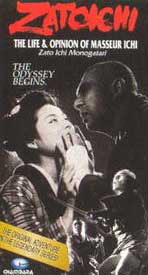 It seems like aeons ago, the first time I saw a Zatoichi film in one or the other of Seattle's two Japanese theaters of the day, I came out of the cinema weak-kneed & overawed. These films balanced the seriousness of artful historical films with the escapist attraction of action films, with a central performance that no amount of praise can exaggerate. It seems like aeons ago, the first time I saw a Zatoichi film in one or the other of Seattle's two Japanese theaters of the day, I came out of the cinema weak-kneed & overawed. These films balanced the seriousness of artful historical films with the escapist attraction of action films, with a central performance that no amount of praise can exaggerate.
The very first movie about the blind swordsman Zatoichi is a beautifully filmed black & white widescreen affair. Chishi Makiura's cinematography is moody & pictorial. In several Zatoichi episodes, besides episodes of Lone Wolf with Child & Kyoshiro Nemuri the Full Moon Swordsman, Makiura helped sustain a classic beauty to series films so that they would not flag for visual quality. But for tense atmosphere Life & Opinion of Masseur Ichi aka The Tale of Zatoichi (Zatoichi monogatari, 1962) is his best.
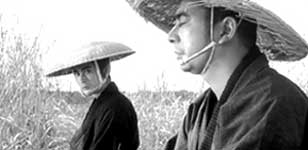 Akira Ifukube was one of jidai-geki's greatest soundtrack composers & the theme & soundscape for the films is as remarkable as the cinematography. Akira Ifukube was one of jidai-geki's greatest soundtrack composers & the theme & soundscape for the films is as remarkable as the cinematography.
Director Kenji Misumi rose well above his own high standards, & Shintaro Katsu as Ichi knew how he wanted this character to be received right from the start. This pilot film set a mood & a standard one might suppose would be impossible to achieve under the time & budget restraints, & surely no one could've guessed the series would be a gold mine for Daiei Studios for many years to come. But somehow what might've been just a competent B film came out brilliant from the start.
Katsushin was already thirty years old when he made his first Zatoichi film, & a little pudgy. His bow-legged blind walk, his monk-shaven head, his age & body shape, are actually very beautiful physical traits, but hardly what one expects from a swordfighting film hero. He's underdog in social position & his very posture reveals it. He's Outcast as Everyman.
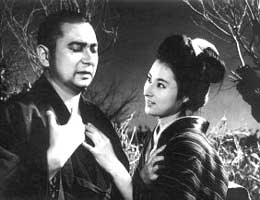 Whoever sees him journeying from village to village on the old Japan footpaths sees only an itinerant masseur or "zato," a traditional occupation for blind men. The humble sweetness of Ichi's character is balanced by a gloominess & pride. Whoever sees him journeying from village to village on the old Japan footpaths sees only an itinerant masseur or "zato," a traditional occupation for blind men. The humble sweetness of Ichi's character is balanced by a gloominess & pride.
He's proud of his gambling skills which make him so much more than a zato, & he learned the iai rapid-draw to gain manly respect in spite of his infirmity.
But at the same time he is ashamed of what he is (a lowly yakuza) & when confronted by people who live decent lives & strive never to harm others, he feels compelled to move into the shadows. But when he perceives decent folk injured by his kind, & a bitter chivalry rises in him to punish whoever has failed to know their place.
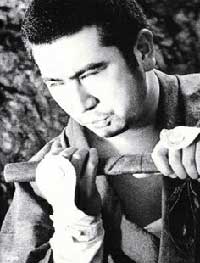 Although by no means humorless, Ichi's sombreness dominates the first two features; larger doses of humor would come later. Although by no means humorless, Ichi's sombreness dominates the first two features; larger doses of humor would come later.
As a matatabi wandering yakuza, Ichi's gambling skills are commonly underestimated due to his blindness, & he takes adventage of crooked gamblers' attempts to take advantage of him. He thus has an ability to make a fair living from the gaming he so enjoys, & tries to stay out of fights.
But when his unexpected iai fast-draw becomes known, he is always at some risk of being expected, through obligation of a night's lodging, to undertake some harmful mission in service of the oyabun or gambling boss who houses him.
Ichi's nemesis in this first episode cannot be regarded as an enemy, as each admires the other so much. The realities of the world they move in will pit them against one another. Ichi is rarely eager to fight, however ferocious once engaged. The yojimbo Hirate (Shigeru Amachi) is not just a fated opponent, he's a tubercular man who wants to find a swordsman capable of outmatching him so that he may die a samurai's death instead of a sickly death coughing up blood.
 One of the conventions of the series is that women are attracted to Ichi's good nature, but he avoids romantic entanglements knowing a gambler's life is not for decent people, certainly not for a decent woman. One of the conventions of the series is that women are attracted to Ichi's good nature, but he avoids romantic entanglements knowing a gambler's life is not for decent people, certainly not for a decent woman.
Otane (Masayo Banri) is the female lead in the first two films & will return one more time in the fourth feature. She's decent to the core, & Ichi comes to care about her a great deal. She is periodically in need of just such a defender, for her brother (Michio Minami) is just about the worst relative anyone could have, without qualms using or misusing her to his advantage.
The first two thirds of the film are mainly about character complexities & interactions. The final third is more about action. Ichi's combination of compassion & capacity for mass slaughter rises well above the usual chambara or swordfilm fare, as his portrayal is layered & nuanced, as are his relationships, so that whether he's standing still looking sad, or reaving madly through a gaggle of thugs, he's just fascinating to observe.
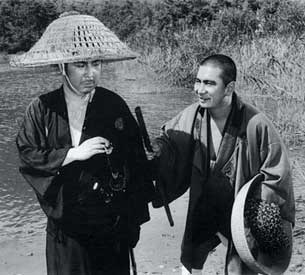 The second episode is the only other one in black & white, & in some ways they are visually more beautiful than later full color episodes, brilliant though the cinematography tends to be throughout the series. The second episode is the only other one in black & white, & in some ways they are visually more beautiful than later full color episodes, brilliant though the cinematography tends to be throughout the series.
As dead-serious tales these first two have a classic look & tone, & for the second feature, cinematographer Shozo Honda captures something of the elegance of the very best jidai-geki swordplay films of the decade preceeding.
As The Return of Masseur Ichi (Zoku Zatoichi monogatari, 1962) opens, Ichi visits the tomb of the samurai bodyguard Hirata who he was sad to have killed in the first film. There's fine continuity between the first two films, which practically constitute one long epic when viewed back to back.
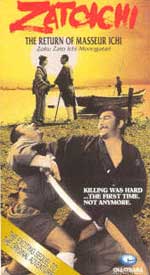 A group of gamblers demand everyone clear out but Ichi is sound asleep & doesn't hear them. They in consequence raise him up to toss him into the middle of a river, & the startled Ichi does one of his fabulous fast-draws with his blind man's canesword, & cuts the gambler's boss while in mid-air. The local gangsters in consequence want Ichi's blood in revenge. A group of gamblers demand everyone clear out but Ichi is sound asleep & doesn't hear them. They in consequence raise him up to toss him into the middle of a river, & the startled Ichi does one of his fabulous fast-draws with his blind man's canesword, & cuts the gambler's boss while in mid-air. The local gangsters in consequence want Ichi's blood in revenge.
Ichi makes a living both as a wandering masseur & a gambler. He is hired by a travelling daimyo (lord) who is very ticklish. Ichi soon catches on that the guy is a bit goofy in the head. The daimyo's retainers don't want it getting out that their lord is crazy, so now there are samurai as well as yakuza after Ichi's life.
A brooding, sad-faced samurai is played by Tomisaburo Wakayama. He is playing Zatoichi's brother, Yoshiro, & Wakayama really was Shintaro Katsu's brother, so it's great casting. He fights magnificently, the superb choreography reflecting the sorrowful attitude of the character.
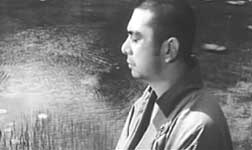 Ichi we well know is not nor ever was of samurai heritage, so it's not surprising to find out that Yoshiro is merely disguised as a samurai to evade the law, but what a samurai he would've been! Ichi we well know is not nor ever was of samurai heritage, so it's not surprising to find out that Yoshiro is merely disguised as a samurai to evade the law, but what a samurai he would've been!
There's a bit of information about when Ichi went blind & it contradicts later episodes. This one assumes he hails from Joshu & was old enough to be betrothed when his sight began to fail, & his brother was able to steal away Ichi's girl in consequence, resulting in lasting emnity between them. The preferred biography of Zatoichi has him blind since childhood, & orphaned.
There is much protest of samurai ethos in this film as there is in the period films of Daisuke Ito or Masaki Kobayashi. There is a context of rebelliousness & sorrow to all the duelling that goes on in this episode & to some degree in every episode of the series. Thereby the beautiful fight choreography & bloody mayhem is infused with a Buddhist sense of "the sadness of things." It's not regarded as a good thing that Ichi is driven by circumstances to kill; but it's often inescapable.
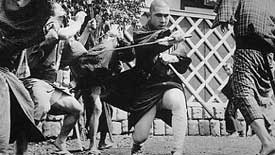 Yoshiro has a crippled arm as the result of Ichi's anger back when Yoshiro stole his girl, so his strong sword style is a one-handed method. The unavoidable duel with Yoshiro is splendidly enacted & when Ichi finally manages to run his brother through, there follows an extremely pitiful sequence as regretful Ichi attempts to keep his brother alive. Yoshiro has a crippled arm as the result of Ichi's anger back when Yoshiro stole his girl, so his strong sword style is a one-handed method. The unavoidable duel with Yoshiro is splendidly enacted & when Ichi finally manages to run his brother through, there follows an extremely pitiful sequence as regretful Ichi attempts to keep his brother alive.
After this unfortunate outcome, the darkest of dark gloom descends upon Ichi, who sets out like a creature from Emma's hell to kill one more appalling gambling boss.
I absolutely adore these first two Zatoichi films which are so greatly about character but with plenty of action especially in the climaxes. In a series that sustained such a high level of quality throughout, it's hard to pick favorites, but the first two considered as one huge epic would have to be in the highest ranked of the twenty-five primary episodes released through two decades.
copyright © by Paghat the Ratgirl
|
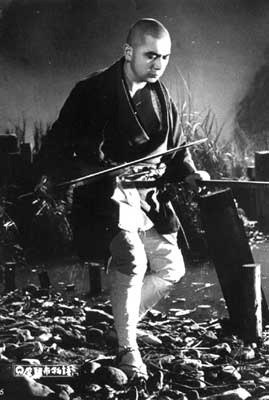

 Akira Ifukube was one of jidai-geki's greatest soundtrack composers & the theme & soundscape for the films is as remarkable as the cinematography.
Akira Ifukube was one of jidai-geki's greatest soundtrack composers & the theme & soundscape for the films is as remarkable as the cinematography. Whoever sees him journeying from village to village on the old Japan footpaths sees only an itinerant masseur or "zato," a traditional occupation for blind men. The humble sweetness of Ichi's character is balanced by a gloominess & pride.
Whoever sees him journeying from village to village on the old Japan footpaths sees only an itinerant masseur or "zato," a traditional occupation for blind men. The humble sweetness of Ichi's character is balanced by a gloominess & pride. Although by no means humorless, Ichi's sombreness dominates the first two features; larger doses of humor would come later.
Although by no means humorless, Ichi's sombreness dominates the first two features; larger doses of humor would come later. One of the conventions of the series is that women are attracted to Ichi's good nature, but he avoids romantic entanglements knowing a gambler's life is not for decent people, certainly not for a decent woman.
One of the conventions of the series is that women are attracted to Ichi's good nature, but he avoids romantic entanglements knowing a gambler's life is not for decent people, certainly not for a decent woman.
 A group of gamblers demand everyone clear out but Ichi is sound asleep & doesn't hear them. They in consequence raise him up to toss him into the middle of a river, & the startled Ichi does one of his fabulous fast-draws with his blind man's canesword, & cuts the gambler's boss while in mid-air. The local gangsters in consequence want Ichi's blood in revenge.
A group of gamblers demand everyone clear out but Ichi is sound asleep & doesn't hear them. They in consequence raise him up to toss him into the middle of a river, & the startled Ichi does one of his fabulous fast-draws with his blind man's canesword, & cuts the gambler's boss while in mid-air. The local gangsters in consequence want Ichi's blood in revenge. Ichi we well know is not nor ever was of samurai heritage, so it's not surprising to find out that Yoshiro is merely disguised as a samurai to evade the law, but what a samurai he would've been!
Ichi we well know is not nor ever was of samurai heritage, so it's not surprising to find out that Yoshiro is merely disguised as a samurai to evade the law, but what a samurai he would've been! Yoshiro has a crippled arm as the result of Ichi's anger back when Yoshiro stole his girl, so his strong sword style is a one-handed method. The unavoidable duel with Yoshiro is splendidly enacted & when Ichi finally manages to run his brother through, there follows an extremely pitiful sequence as regretful Ichi attempts to keep his brother alive.
Yoshiro has a crippled arm as the result of Ichi's anger back when Yoshiro stole his girl, so his strong sword style is a one-handed method. The unavoidable duel with Yoshiro is splendidly enacted & when Ichi finally manages to run his brother through, there follows an extremely pitiful sequence as regretful Ichi attempts to keep his brother alive.